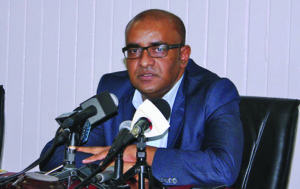…this time to challenge Govt’s imposition of 14% VAT on private education

Parents, students and other concerned stakeholders will take to the streets on February 28 to protest Government’s imposition of 14 per cent Value Added Tax (VAT) on private education – a decision which many are urging to be repealed.
Opposition Leader Bharrat Jagdeo in a statement to the media on Tuesday, called on the Government to reverse the imposition of VAT on private education.
“We say to the Government that if they so badly need revenue, then cut Ministerial salaries, overseas trips by Ministers and per diem allowances of Ministers by 50 per cent. Our children’s education is a more worthwhile investment,” the statement from the Office of the Opposition Leader read.
The missive outlined that education has long proven itself to be the surest and safest vehicle to exit the vicious cycle of poverty and that taxing such a service is callous and cruel.
“We again express our strong dissent to the imposition of VAT on private schools and private educational systems. We regard this imposition as an expression of callousness and cruelty to the children and the parents of those children who are attending these private educational institutions,” the statement said.
Jagdeo’s office contended that the imposition of VAT on private educational institutions would certainly amount to discrimination since, students and parents attending public schools do not bear this burden.
The Office of the Leader of the Opposition reminded that under the People’s Progressive Party/Civic Administration, it encouraged the growth and proliferation of private schools throughout the country out of a firm belief that parents and children alike should have the freedom and option to access education from private as well as public schools and institutions.
It pointed out that as a result, a very strong and viable private education industry has developed across the country.
Protest
Meanwhile, civil society has responded vigorously against the brain tax. Students, parents, teachers, members of the business community and other disgruntled stakeholders will be holding a silent protest outside of the Guyana Revenue Authority (GRA) on February 28.
Persons from the Nations School of Business, Marian Academy, New Guyana School and other private educational institutions across the country have been invited to join the activity – which is expected to be a weekly exercise to voice the nation’s frustrations.
Persons desirous of supporting the cause are encouraged to show up at the assembly point in front of the GRA on Camp Street with their own placards; the protest will commence from 12:00h.
The protest action is just another in a list of activities being taken by civil society in expressing its disapproval of Government’s move to tax education.
Already, a mass online movement is gaining momentum where hundreds of persons have signed a petition against Government’s decision to charge 14 per cent on private educational services.
The organised campaign argued that the imposition of the 14 per cent VAT on private schools will impact very heavily on the children and youth attending those schools.
“For some, the perception is that anyone who attends a private school must be wealthy. That perception may be true for a certain percentage but, for the majority, attendance at such schools often represents a real sacrifice by a family member,” the body explained.
Director of the School of the Nations, Dr Brian O’Toole, highlighted that one of the most popular courses in Guyana, with more than 1000 students, is the ABE programme with courses for school leavers, in business, management, travel and tourism and computer technology.
He said this imposition may force many students to abandon their pursuance of a sound education altogether.
According to the educator, “the only hope for Guyana moving forward is an educated, motivated pool of youth who see Guyana as theirs. This new tax does nothing to further that vision, that sense of optimism, the idea that they can rise out of poverty.”



